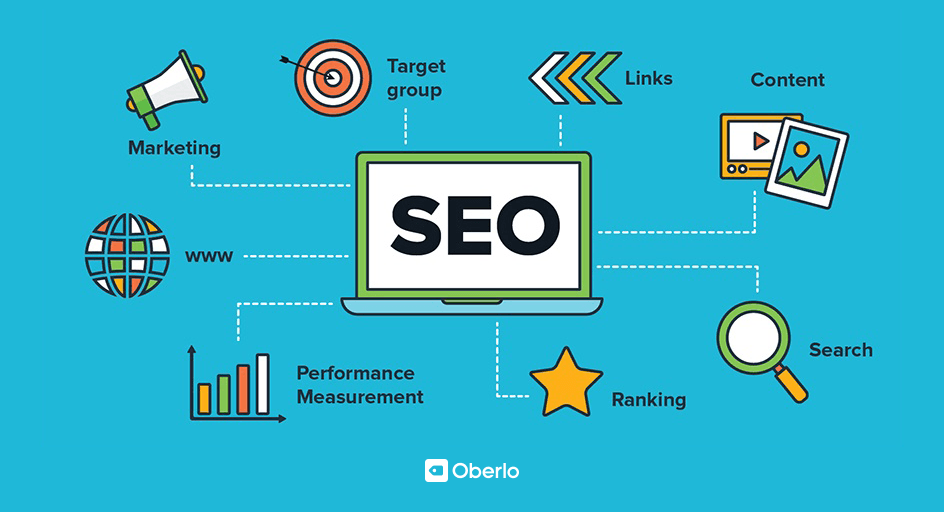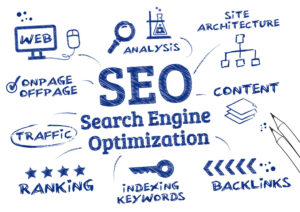Understanding SEO: The Key to Online Success
In today’s digital world, simply creating a website is not enough. If people can’t find your website on Google or other search engines, your efforts may go unnoticed. This is where SEO (Search Engine Optimization) comes in.

What is SEO?
SEO is the process of improving your website so that it ranks higher on search engine results pages (SERPs). The higher your site appears, the more likely people are to visit it. SEO focuses on organic traffic—visitors who come to your site naturally, not through paid ads.
Why is SEO Important?
- Increases Visibility: A well-optimized website appears at the top of search results.
- Builds Trust: Users often trust websites that rank higher.
- Drives Targeted Traffic: SEO helps attract visitors who are genuinely interested in your products or services.
- Cost-Effective: Unlike paid ads, organic traffic is free.
Key Elements of SEO
- On-Page SEO – Optimizing your content, titles, headings, keywords, and internal links.
- Off-Page SEO – Building backlinks, social signals, and improving domain authority.
- Technical SEO – Ensuring fast website speed, mobile-friendliness, and proper indexing.
- Content SEO – Creating high-quality, valuable, and original content that answers user queries.

Core Components of SEO
1. On-Page SEO
On-page SEO refers to optimizations made directly on your website. These include:
- Keyword Optimization: Using relevant keywords naturally in titles, headings, and content.
- Content Quality: Creating informative, engaging, and original content that answers user queries.
- Meta Tags: Writing compelling title tags and meta descriptions that encourage clicks.
- Internal Linking: Linking to other pages within your site to improve navigation and authority.
- Mobile-Friendliness: Ensuring your site adapts well to smartphones and tablets.
2. Off-Page SEO
Off-page SEO focuses on building your website’s reputation through external factors:
- Backlinks: Links from other trusted websites signal to search engines that your site is authoritative.
- Social Media Signals: Sharing and engagement on platforms like LinkedIn, Instagram, or Twitter can increase visibility.
- Brand Mentions: Even without direct links, mentions of your brand online contribute to SEO.
3. Technical SEO
This involves the backend structure of your site:
- Website Speed: Fast-loading pages improve user experience and rankings.
- Secure Connection (HTTPS): Security is now a ranking factor.
- Crawlability: Ensuring search engines can access and index your website easily.
- Structured Data (Schema Markup): Helps search engines understand your content better.
4. Content SEO
In 2025, content remains king. Google rewards websites that provide value-driven, user-focused content. Blogs, videos, infographics, and FAQs tailored to user intent help attract and retain visitors.
The Role of AI and Voice Search in SEO
The future of SEO is being shaped by technology. With AI-driven algorithms like Google’s RankBrain and BERT, search engines now understand context and user intent better than ever.
Moreover, voice search is on the rise with smart assistants like Alexa, Siri, and Google Assistant. People are now searching in conversational tones, for example: “What’s the best café near me open right now?” Optimizing for voice search means focusing on long-tail keywords and natural language.
SEO Best Practices for 2025
- Focus on User Intent
Go beyond keywords and create content that directly answers users’ questions. - E-E-A-T Principle (Experience, Expertise, Authoritativeness, Trustworthiness)
Google rewards content that demonstrates credibility and real-world knowledge. - Mobile-First Indexing
With most searches happening on mobile, ensure your site is responsive and user-friendly. - Video Content Optimization
Videos continue to dominate. Optimize video titles, descriptions, and transcriptions for SEO. - Local SEO
For small businesses, optimizing for local searches (like “near me” queries) is crucial. Google My Business profiles and customer reviews play a big role here. - Continuous Monitoring
SEO is not a one-time effort. Use tools like Google Analytics and Search Console to track performance and adjust strategies.

The Long-Term Value of SEO
Unlike trends that come and go, SEO is here to stay. It evolves, but the core idea remains: helping people find what they’re looking for online. Businesses that invest in SEO build a strong digital foundation that brings consistent traffic, leads, and sales.
In 2025 and beyond, SEO is not just about ranking—it’s about delivering the best possible experience to users while aligning with search engine guidelines. Companies that understand this balance will continue to thrive in thewww.linkedin.com/in/tulasi1989b
Conclusion
SEO is more than just a marketing tool—it’s a necessity for survival in the digital era. Whether you’re a small business owner, an entrepreneur, or a global brand, implementing the right SEO strategies can transform your online presence. From on-page optimization and content creation to technical improvements and off-page credibility, every aspect of SEO contributes to your growth.
